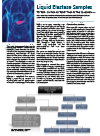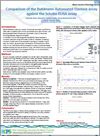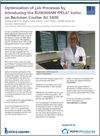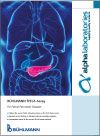Pancreatic Elastase Assays
Easy and convenient screening for exocrine pancreatic insufficiency
Pancreatic insufficiency is the reduction of production or transportation of the digestive enzymes which results in the inability to properly digest a meal (fats, proteins and carbohydrates).
Pancreatic elastase is a proteolytic enzyme produced exclusively in the pancreas and is highly stable throughout the intestinal passage. Due to its high stability, the concentration of this enzyme can be measured in faeces to reflect the exocrine secretory capacity of the pancreas.
Applications
For many labs, the faecal elastase assay is the preferred test used to screen for exocrine pancreatic insufficiency, characterised by a low concentration of pancreatic elastase in faeces. Exocrine pancreatic insufficiency can be caused by numerous conditions, including: chronic pancreatitis, cystic fibrosis, diabetes mellitus, cholelithiasis, hereditary pancreatitis, chronic inflammatory bowel disease, pancreatic carcinoma, autoimmunologically caused pancreatitis, Shwachman-Diamond syndrome, autoimmune and connective tissue diseases, and Zollinger-Ellison syndrome.
The test is easy to perform, and convenient for patients as only one sample is required and the test is non-invasive. It has replaced the gold standard faecal fat test in most laboratories.
BÜHLMANN fPELA® Assay
The BÜHLMANN fPELA® assay for faecal pancreatic elastase utilises the same CALEX extraction device as the fCAL turbo assay, so it is possible to run both tests from a single extract.
The fPELA assay is random access and runs on standard clinical chemistry analysers (Roche, Abbott, Beckman, Siemens etc) although there is also the BioSystems BA 200, a stand-alone solution as well.
The assay is turbidimetric, with a dynamic range of 10 - 5000μg/g. Time to first result is 10 minutes with further results following every few seconds thereafter, making it one of the fastest faecal elastase assays available.
Results are comparable to the current ELISA based methods.

Case Studies
-

Liquid Elastase Samples To Test, or Not to Test? That is The Question…
Alison Jones, Consultant Clinical Biochemist, York and Scarborough NHS Foundation Trust28/06/23 Download: 1011KB -

Comparison of the BÜHLMANN Automated Elastase assay against the Schebo ELISA assay
Poster UKMedLab 2023 - Evans et al. ,
Black Country Pathology Services28/06/23 Download: 752KB -

A Game Changer for Faecal Elastase Testing
Switching to the new fPELA turbo assay for improved workflow and efficiency
Spire Healthcare07/02/23 Download: 13.9KB -

Introduction of the Random Access Measuring BÜHLMANN fPELA® turbo on Roche cobas® 8000
An interview with Yvonne Schallberger, Bioanalytica, Lucerne, Switzerland07/02/23 Download: 14.28KB -

Successful Implementation of the BÜHLMANN fPELA® turbo on Roche cobas® c502
A report from Dr. Marc-Antoine Bagnoud*, Dianalabs in Geneva, Switzerland07/02/23 Download: 14.72KB -

Optimisation of Lab Processes with the BÜHLMANN fPELA® turbo assay on the Beckman Coulter AU 5800
Testimonial from Angela Suter and Dr. Cyril Fuhrer*, Synlab Suisse SA, Lucerne, Switzerland07/02/23 Download: 13.30KB -

BÜHLMANN fPELA® turbo on cobas® c501
A report from Dr. Jörg Oliver Thumfart*, Labormedizinisches Zentrum Dr. Risch31/12/20 Download: 8.09KB -

A New Era in Pancreatic Elastase Testing
by Rachel Navin and Sarah Rogers, York Hospital24/02/22 Download: 6.61KB








